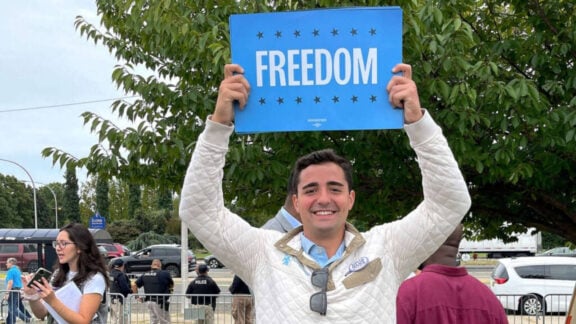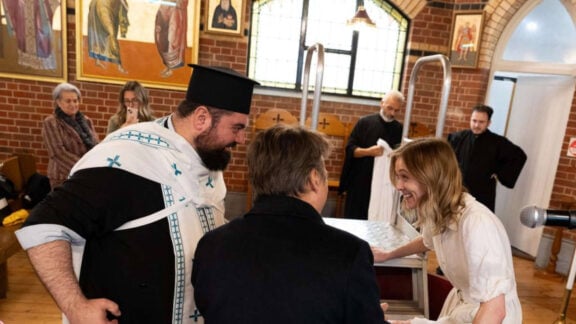Earlier this week, Lee Tarlamis OAM spoke in Victoria’s Parliament about this year’s commemorations marking the Bicentenary of the Greek War of Independence and the establishment of modern Greece.
Mr Tarlamis delved into the legacy of Greece that touches many aspects of our modern lives – from its artistic creations, the arts, medical discoveries and scientific explorations – influencing the generations, and its architectural inspirations much like the very Parliament that he delivered this speech in, the State Library and so many other buildings we see every day.
“From our memorial of remembrance to those who served and died, Melbourne’s own Shrine of Remembrance; its design having been basing on the Mausoleum of Halicarnassus, to its contribution to the emergence of democracy,” Lee Tarlamis said.
And as we are commemorating Greece’s fight for freedom on 25 March, he acknowledges an important Victorian connection to that liberation, where our history of immigration connects us with great naval victory at Navarino bay on 20 October 1827 – which played a major contribution to the success of the revolution.
Mr Tarlamis also touched on the connection with our own Anzac story through new Greek migrants who would die as Anzacs at Gallipoli and during the Greek campaign of 1941 in Crete.
All worthy reasons for the Victorian government is proud to be supporting the many events being planned for this year.
Addressing the Parliament, Mr Tarlamis, said:
“In this we celebrate both an important milestone in modern history – a nation re-born into the family of modern nations – but also the gift of Hellenic civilisation and its legacy in the modern world.
The legacy of Classical Greece is obvious to all – who have the privilege to sit in this chamber and this parliament.
Greece’s architectural innovations – who’s supreme example stands on the Acropolis in Athens – have influenced world architectural design ever since.
When people wanted to establish grand public buildings, one of their main inspirations was the architecture of Classical Greece.
The columns and pediments of our own Parliament, the State Library and many other buildings we see every day stand testimony to this.
And when we wanted to erect a memorial of remembrance to those who served and died in the First World War, the people of Melbourne again reached back to classical Greece – basing their design for the Shrine of Remembrance on the Mausoleum of Halicarnassus.
And I recently read the fine history of the Shrine written by Professor Bruce Scates which I recommend to you.
The legacy of Greece touches many aspects of our modern lives – with its artistic creations – medical discoveries and scientific explorations – influencing the generations.
After all – it is not by chance that our modern medical profession – on whom we are so indebted in their efforts to respond to the current pandemic – abide by an oath written by one Hippocrates – from the Aegean island of Kos.
Emerging from myths and legends of ancient Greece – the words of the great writers of classical Greece – from the playwrights Sophocles and Euripides – the epics of Homer and the histories of Thucydides and Herodotos – from whom we were given the word history – have all influenced the modern world.
Hellenic influence can be found throughout the arts.
Melbourne’s own George Johnston – author of the iconic Australian novel My Brother Jack – sought inspiration in Greece.
And renowned Victorian sculptor Peter Corlett OAM traveled to Greece to learn more about sculpture, the trip providing inspiration for our own Lemnos Gallipoli Memorial in Albert Park.
As a Member of Parliament, I have to acknowledge the debt we owe to the emergence of democracy in classical Greece.
From those first stirrings of popular participation in government, from their local assemblies in the agoras across Greece, to those beneath the walls of the great Acropolis in Athens – democracy has spread throughout the world.
This Bicentenary year we should be thankful for this gift.
I have been fortunate to visit Greece on many occasions and I have also stood before the earliest archaeological remains of a parliament that stands on the Aegean island from which my father came – at Poliochni on Lemnos.
I recount these achievements as evidence of the Greece’s legacy to the world.
This is a legacy that excited philhellenes across the world, to join with those in Greece and across the Hellenic diaspora, to dream and act so that Greece once again would be free to choose its own destiny and to take its place amongst the modern nations of the world – to paraphrase Lord Byron – perhaps the most well-known Philhellene.
And as we are commemorating Greece’s fight for freedom, we should acknowledge an important local connection to that liberation.
Given Victoria’s history of immigration, it’s no surprise that some of the British sailors who fought in the great naval victory at Navarino bay on 20th October 1827 – playing a major contribution to the success of the revolution – would come to Australia and make their homes in Victoria – men like former Lieutenant Alfred Aubrey and Midshipman Richard Bunbury, the latter who would become a friend of our then Governor Charles La Trobe.
The Lemnos Gallipoli Commemorative Committee is working with others to honour these forgotten Australian heroes of the Greek war of independence.
Greece is also linked to our own Anzac tradition. A new Greek migrant – Peter Rados – would die as an Anzac at Gallipoli.
And in this the year of the 80th anniversary of the Greek campaign of 1941 we cannot overlook a young Private from St Kilda, James Zampelis, whose family had come to Melbourne from the Ionian Island of Lefkada, who would be killed in the olive groves of Crete.
Two Hellenes who died in the service of Australia. Lest we forget.
For all these reasons, I – along with many other Victorians – indeed Australians – will join with those in our community to celebrate the bicentenary of the Greek War of Independence and the debt we all owe to Hellenic civilisation.
These gifts have enriched our world, in the arts, science and much more.
They are part of the long march of civilisation and progress which has delivered to us the freedoms, prosperity and health which we enjoy today.
I congratulate the Premier and the Victorian Government for its initiative in providing support to many community initiatives which will celebrate the Bicentenary throughout the coming year as well as all those in the community that have come forward to develop these events and celebrations.
And I encourage everyone to consider the Hellenic heritage that all Victorians and Australians enjoy.
Truly, a reason for celebration.”
You can also watch Lee Tarlamis’ address here:









